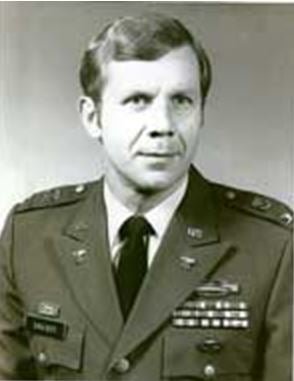- Colonel
- Vietnam
Biography
Colonel Philip J. Saulnier is a native of Lynn, Massachusetts and a 1956 graduate of Lynn Technical High School. He played varsity basketball and football for three years and was selected co-captain of the football team his senior year. He was inducted into Lynn Tech’s Hall of Fame in 1985. Saulnier began his military career at the age of 17, enlisting in the US Navy Reserve Submarine Service.
In 1957, Saulnier enrolled at Bridgton Academy, North Bridgton, Maine, for additional college preparatory classes. At Bridgton, he played ice hockey and football and was selected co-captain of the football team. He was elected President of his class and inducted into Bridgton’s Hall of Fame in 2006.
Saulnier entered the University of Rhode Island in 1958 on a football scholarship, enrolled in the Army ROTC program for four years, and became a member of Theta Chi Fraternity. During his senior year, he served as Cadet Colonel of the ROTC Brigade. He was selected as co-captain of the football team, President of the Scabbard and Blade Society, President of the Rhode Island Letterman’s Club, and selected as Who’s Who in American Colleges & Universities. Additionally, he was a Distinguished Military Graduate and received the URI ROTC Leadership Award.
In 1962, Saulnier graduated with a Bachelor of Science Degree in Physical Education and was commissioned as a Second Lieutenant of Infantry. Immediately upon graduation, Second Lieutenant Saulnier joined the 82d Airborne Division at Fort Bragg, North Carolina as an Infantry Platoon Leader. He completed Ranger and Airborne Training and earned the Expert Infantryman’s Badge during his assignment with 82d Airborne Division.
First Lieutenant Saulnier volunteered for duty in Vietnam; and upon arriving in September 1964, he was assigned as an Infantry Battalion Advisor and immediately faced combat operation. His skills in combat were especially motivating to the Vietnamese Battalion Commander and Company Commanders. Lieutenant Saulnier was awarded the Combat Infantryman’s Badge, Bronze Star, and Air Medal for his combat service in Vietnam.
Following his tour of duty in Vietnam, Captain Saulnier transferred to the Quartermaster Corps and was assigned to the 5th Infantry Division, Fort Carson, Colorado, as the Company Commander, A Company, 5th Supply and Transport Battalion and Battalion Executive Officer. His knowledge and experience of logistics support, infantry tactics, and Ranger techniques significantly improved the overall readiness and fighting capability of his unit. He was selected for early promotion to Major.
Major Saulnier again volunteered for duty in Vietnam. As a logistics staff officer, he constantly exposed himself to hostile conditions to better assess Combat Engineer requirements in support of the lines of communications within Vietnam. Major Saulnier was awarded the Bronze Star Medal with Oak Leaf Cluster for his combat service in Vietnam. He was selected for early promotion to Lieutenant Colonel.
Lieutenant Colonel Saulnier’s next assignment was as the Commander, 9th Supply and Transport Battalion, 9th Infantry Division, Fort Lewis, Washington. Major General Jack Walker stated, ”The soldiers within Lieutenant Colonel Saulnier’s Battalion provided the best support I have ever seen by a Combat Service Battalion. Again, the attitude of the officers, non-commissioned officers, and soldiers was outstanding. This positive attitude of support to the war fighter is common in the officers and non-commissioned officers but rarely displayed by all the soldiers of a whole battalion.”
Lieutenant Colonel Saulnier then became the Military Assistant to the Assistant Secretary of the Army and then Executive Officer to the Deputy Chief of Staff for Logistics, Department of the Army. He was selected for early promotion to Colonel.
Colonel Saulnier’s next assignment was as the Commander, 46th Support Group, Fort Bragg, North Carolina. His accomplishments as a Group Commander reflected the highest physical and mental courage. He created a leadership climate that allowed planning and decision making by subordinates in supporting the “War Fighter.”
Colonel Saulnier was medically retired from the United States Army on 18 December 1985, thus cutting short a brilliant career of service to our country. Major General Emmett W. Bowers summarized Colonel Saulnier’s contribution to the US Army in the following words: “His contribution to the Army continues to expand in multiples. The hundreds of officers and non-commissioned officers mentored and supported by him continue to mentor and develop thousands of others.” Upon his retirement, he was awarded the Legion of Merit. Colonel (Ret) Saulnier was inducted into the U.S. Army Quartermaster Corps Hall of Fame in 2002.
Phil Saulnier continued his leadership philosophy of mission accomplishment and professional development of subordinates into a very successful civilian career. As the Director, East Region, National Industries for the Severely Handicapped, he helped change the lives of thousands of individuals with disabilities and their families by developing a team of professionals who created employment opportunities for individuals with disabilities. In 2003, Saulnier founded America’s Pride: Supporting Service-Connected Disabled Veterans Inc., an organization providing vocational support to Veterans.
Phil Saulnier has been and continues to be an active URI alumnus. He was the President of the Washington, DC Alumni Chapter, member of the URI Alumni Executive Committee, Trustee of the URI Foundation, member of the URI ROTC Alumni Chapter, recipient of the Ram Award in 2004, contributor to the URI annual fund drive, and established two scholarships: the Saulnier-Stone Memorial Scholarship and the Phil Saulnier Football Scholarship. In honor of his work and leadership, the University of Rhode Island awarded Phil Saulnier the Honorary Doctor of Humane Letters in May of 2012.
Colonel Saulnier and his wife Judy reside in Virginia. They have three children: Colonel Michael P. Saulnier, U.S. Army, Retired; Robert S. Saulnier (deceased); and Dr. Charlotte E. LeMoyne.
Education
1962

